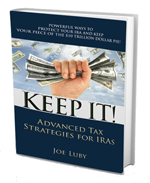Alternative Investments Are Solution To Fiscal Cliff
Categories: Education, Investment Strategies, Retirement Strategies, Tax StrategiesEveryone, including me as of this writing, is talking about the fiscal cliff that we’re rapidly approaching as a nation and will leap off on January 1, 2013. If you’re reading this, then you already know the fiscal cliff involves, in part, a substantial amount of tax increases. These increases will make many transactions and events more painful when the individual has to sign the final check made out to Uncle Sam.
Examples of these transactions are IRA-to-Roth IRA conversions, IRA required minimum distributions (RMDs), gifting transactions subject to gift tax, and estate tax calculations. The amount written on that check to Uncle Sam in all of these events depends directly on the fair market value (FMV) of the assets involved in the transaction. For example, a one hundred thousand dollar Roth conversion in 2012 will cost a lot less in tax than the same event in 2013.
Interestingly, alternative investments (AIs) offer a major solution to the fiscal cliff problem, yet hardly any broker/dealers or asset sponsors are using this to their advantage. These entities invariably report the value of such assets at their net asset value (NAV). NAV is entirely different from FMV (although in some circumstances they may be equal by coincidence but not by definition). Importantly, FMV is typically much lower than NAV because IRS rules on valuation of non-traded investments (i.e. almost every alternative investment out there including non-traded REITs, BDCs, hedge funds, etc.) require that certain features be taken into account when determining FMV. These features do not apply when calculating NAV. Such features include discounts to valuation for lack of marketability, lack of control, illiquidity, and many others. If a non-traded REIT share has a NAV of $9, but can’t be sold anywhere to anyone on the planet for $9, then why would companies (and consequently taxpayers) report the value as such for taxable events?
The rules say it should be valued at what a neutral third party would pay for it in an arms-length transaction. The fact that a shareholder can’t find a buyer at $9 should serve as a red flag that this isn’t the proper tax reporting valuation. Perhaps there are secondary market transactions of this particular REIT in the $5 range. If so, this is probably more indicative of the proper value to be used in taxable event reporting (actual FMV can only be determined by means of an appraisal). Imagine the difference in tax owed between a Roth conversion with 10,000 shares at $9 ($90,000) versus a Roth conversion with 10,000 shares valued at $5 ($50,000). Same asset, same number of shares, same taxable event, but a completely different outcome based solely on proper determination and reporting of FMV as required by the IRS.
Alternative assets have this unique built-in, pre-existing feature that provides this incredible tax benefit. AI sponsors, selling broker/dealers and advisors to individual clients should all be reviewing these opportunities in order to help their clients turn the fiscal cliff into more of a gentle slope.



